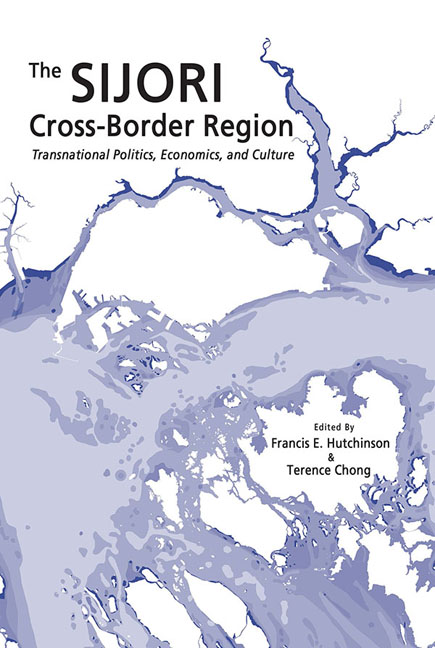Book contents
- Frontmatter
- Contents
- List of Maps
- List of Tables
- List of Figures
- Foreword
- Acknowledgements
- Contributors
- Abbreviations
- Introduction
- Section I Understanding the Whole
- Section II Policy and Politics
- Section III Cross-Border Social and Cultural Communities
- Map4
- 9 The Significance of Riau in SIJORI
- 10 Singaporeans Living in Johor and Batam: Next-Door Transnationalism Living and Border Anxiety
- 11 Singapore Malay Family Businesses: Negotiating Malaysian and Singapore Citizenship and National Identities
- 12 Imaginary Frontiers and Deferred Masculinity: Singapore Working-Class Men in Batam
- Section IV Formal and Informal Economies
- Conclusion
- Appendix
- Sources for the SIJORI Maps
- Index
11 - Singapore Malay Family Businesses: Negotiating Malaysian and Singapore Citizenship and National Identities
from Section III - Cross-Border Social and Cultural Communities
Published online by Cambridge University Press: 22 July 2017
- Frontmatter
- Contents
- List of Maps
- List of Tables
- List of Figures
- Foreword
- Acknowledgements
- Contributors
- Abbreviations
- Introduction
- Section I Understanding the Whole
- Section II Policy and Politics
- Section III Cross-Border Social and Cultural Communities
- Map4
- 9 The Significance of Riau in SIJORI
- 10 Singaporeans Living in Johor and Batam: Next-Door Transnationalism Living and Border Anxiety
- 11 Singapore Malay Family Businesses: Negotiating Malaysian and Singapore Citizenship and National Identities
- 12 Imaginary Frontiers and Deferred Masculinity: Singapore Working-Class Men in Batam
- Section IV Formal and Informal Economies
- Conclusion
- Appendix
- Sources for the SIJORI Maps
- Index
Summary
INTRODUCTION
According to Cooke (2001, p. 953), Cross-Border Regions (CBRs) are economic-cumpolitical units that may exhibit cultural or historical similarities. They span across various political jurisdictions, such as the nation-state, and federal or local levels of government. This chapter focuses on the Singapore Malay nuclear family as an entity that operates within one particular CBR: that linking Singapore to the neighbouring southern Malaysian state of Johor, which has ties to other parts of Malaysia. It is argued that in the era of transnational flows, citizenship and the accompanying national identities are not always as state leaders envision them to be, especially within CBRs. The stretching of the nuclear family across borders can position the family as a serious competitor to nation-states over the matters of first, citizenship, and second, national identity, exemplifying the idea that state borders are social constructs (van Houtum 2000, p. 67) that can be challenged and transcended.
This chapter offers two case studies of Malay families straddling borders. In the first, members of the family business illustrate that Singapore citizenship is not necessarily a stable political identity. These Singaporeans veer between retaining their Singapore citizenship and adopting a new citizenship status, that is, a Malaysian one. Thus, where the Singapore Malay family acts as a corporate entity, family members can exercise what anthropologist Aihwa Ong (1999, p. 112) calls “flexible citizenship” — professionals choosing from among different nation-state sites for working and anchoring family based on economic and political advantages that can be gained. These Malays mirror similar processes involving other ethnic groups (see Ong 1999 for an exposition on overseas Chinese) and in other cross-border zones, such as that linking Dubai and neighbouring states (see Kanna 2010). Amongst the Malays considered here, possibilities for such veering arise primarily because of a genealogically anchored shared Malayness spanning Singapore and Johor, discussed below.
A clarification of key concepts employed in this chapter is useful here. “Nationstate” refers to the convergence of the political unit of “state” — a form of organizing political power (Poggi 2006, p. 607) characterized by the presence of physical territory, sources of revenue and bureaucracies (Weber [1921] 1958) — with the cohesive cultural unit of the nation that carries shared identities.
- Type
- Chapter
- Information
- The SIJORI Cross-Border RegionTransnational Politics, Economics, and Culture, pp. 293 - 309Publisher: ISEAS–Yusof Ishak InstitutePrint publication year: 2016



